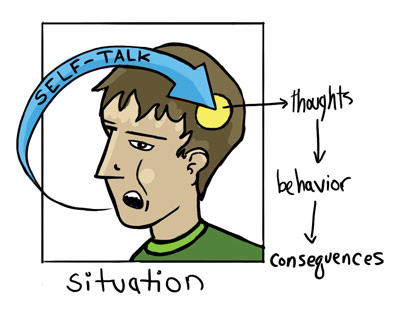Hi all, today I would like to share about the interesting topic, namely "why is emotional intelligence important for everyone", the main reason why I choose that topic because learning about emotional intelligence is more important than learning about intellectual intelligence, The first thing to pay attention when we learn about emotional intelligence is not to use reason to judge, but to look for spiritual gaps from emotional turmoil, In the spiritual gap we will seek the meaning of a phenomenon in this life and then we combine it with the laws of the universe, emotional intelligence (EI) refers to the ability to understand, manage, and use emotions effectively, studying and practicing Emotional Intelligence teaches us valuable lessons that can profoundly improve personal and professional aspects of life. Here are key takeaways:
1. Self-Awareness
Understanding your emotions helps you recognize how they influence your thoughts, behaviors, and decisions. It fosters an accurate sense of your strengths and weaknesses, allowing for better self-regulation and growth.
2. Empathy
EI helps us recognize and understand the emotions of others, fostering deeper connections and compassion. Empathy improves communication, making it easier to resolve conflicts and build trust in relationships.
3. Emotion Regulation
Learning how to manage intense emotions, such as anger, fear, or sadness, enhances self-control and resilience. It helps us remain calm and composed under pressure, leading to better decision-making.
4. Effective Communication
Emotional Inteligence teaches us to express ourselves clearly while being considerate of others' feelings, improving personal and professional interactions. Active listening is a component of Emotional intelligence, it enhances mutual understanding and reduces misunderstandings.
5. Healthy Relationships
Developing EI promotes mutual respect, cooperation, and emotional balance, essential for building meaningful relationships. It helps manage conflicts more constructively, ensuring long-term harmony.
6. Problem-Solving and Decision-Making
By understanding the emotional impact of decisions, Emotional Intelligence aids in making balanced, thoughtful choices. It reduces impulsive decisions driven by unchecked emotions.
7. Stress Management
Emotional Intelligence enables better coping mechanisms for stress, anxiety, and challenges by fostering mindfulness and positive thinking. It encourages adaptability in the face of change.
8. Leadership and Influence
Emotional intelligence is a cornerstone of effective leadership. Leaders with high Emotional Intelligence can inspire, motivate, and manage teams with empathy and clarity. It helps navigate workplace dynamics and influence others positively.
9. Increased Resilience
Emotional intelligence promotes a growth mindset, helping individuals bounce back from setbacks and maintain a positive outlook.
10. Self-Motivation
Emotional intelligence fosters intrinsic motivation by encouraging individuals to set meaningful goals, persevere through challenges, and find joy in their efforts.
By developing emotional intelligence, we enhance our ability to understand ourselves and others, fostering success, happiness, and fulfillment in every aspect of life, now I will discuss with negative impact If people choose not to learn or develop emotional intelligence (EI), it can lead to several challenges in personal, social, and professional areas of life. Here are some potential consequences if people lack of emotional intelligence:
1. Poor Self-Awareness
Without EI, people may struggle to recognize or understand their emotions, leading to impulsive behaviors and decisions. They might overlook the root causes of their feelings, resulting in unresolved emotional issues.
2. Ineffective Communication
Lack of EI can cause misunderstandings, misinterpretation of others' emotions, or difficulty expressing one’s thoughts and feelings clearly.
Conversations may become one-sided, argumentative, or dismissive, harming relationships.
3. Damaged Relationships
Low empathy and poor emotional regulation may lead to conflicts, mistrust, and lack of meaningful connections with others. Inability to handle criticism or provide support could weaken both personal and professional relationships.
4. Increased Stress and Anxiety
Without emotional regulation, people may struggle to cope with stress, frustration, and setbacks. This can lead to burnout, poor mental health, and unhealthy coping mechanisms such as avoidance or aggression.
5. Conflict Escalation
A lack of EI may result in poor conflict resolution skills, causing disagreements to escalate rather than be resolved. This can create hostile environments at home, work, or in social settings.
6. Stagnant Personal Growth
People without EI may find it difficult to reflect on their own behaviors or adapt to constructive feedback, leading to a lack of self-improvement.
They might resist change, limiting their personal or professional progress.
7. Weak Leadership
In leadership roles, low EI can result in micromanagement, poor team dynamics, and a lack of motivation among team members. Leaders without empathy or understanding of others' needs may fail to inspire or retain their teams.
8. Unfulfilled Potential
Emotional intelligence is closely tied to resilience, self-motivation, and long-term goal achievement. Without it, individuals may struggle to overcome obstacles or maintain consistent effort.
9. Lack of Empathy and Social Awareness
People who lack empathy may come across as indifferent, self-centered, or insensitive, damaging their social reputation and isolating them from others. They may miss cues about others’ emotional needs, causing them to appear out of touch or unapproachable.
10. Greater Workplace Challenges
In professional settings, a lack of EI can result in difficulty collaborating, handling criticism, or building rapport with colleagues or clients. This can limit career growth, opportunities, and overall job satisfaction.
The Broader Impact
On a societal level, a widespread lack of emotional intelligence can contribute to greater division, intolerance, and reduced cooperation, making it harder for communities to work together to address challenges or create positive change. Ultimately, the absence of emotional intelligence leads to a life marked by unresolved conflicts, unproductive relationships, and missed opportunities for personal and collective growth.


